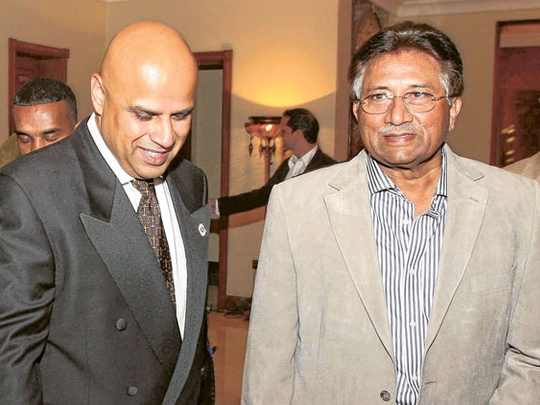
Dubai: Former military ruler of Pakistan Pervez Musharraf has regretted his decision to promulgate the amnesty law known as National Reconciliation Ordinance (NRO), which paved the way for the return of former prime ministers Benazir Bhutto and Nawaz Sharif from exile.
"The NRO was one big mistake I should not have committed and I regret that decision," said Musharraf while speaking at a dinner reception hosted by prominent Pakistani businessman Salman Chaudhry at his residence in Emirates Hills, Dubai. Musharraf was accompanied by his wife Sehba.
The NRO, introduced on October 5, 2007, after a US and UK-brokered deal with Musharraf, paved the way for Benazir Bhutto, the former prime minister, to return home from self-exile and take part in politics without facing trial in cases in which she had been implicated.
It provided amnesty to hundreds of other politicians and civil servants and also made it possible for Nawaz Sharif and Shahbaz Sharif, who were sent into exile to Saudi Arabia, to go back to Pakistan.
The Supreme Court, however, reverted the NRO in 2009 and ordered the government to reopen cases against those given amnesty under NRO rule.
‘Negative' fall-out
"Another big mistake I made was my action against the judiciary and sacking of the Chief Justice [Iftikhar Chaudhry]. Though the action was in line with the Constitution, the fall-out was very negative for me," he said.
During his speech, Musharraf spoke about his recently launched political party, All Pakistan Muslim League (APML), and the reasons behind his joining politics.
"There is political turmoil in Pakistan and the people are now looking for a viable alternative. I am the third political alternative for the Pakistani people," he said.
"My only objective is to save Pakistan which is in danger while its economy is nose-diving and at the same time it faces extremism and terrorism," he said.
He hopes that 60 per cent of Pakistanis, including middle-class educated people, women and youth who do not often vote, would vote for him as there is a yearning for change.
Though Musharraf got a few rounds of applause from the gathering, he also faced some tough questions and got emotional when he was confronted on the military operation at the Lal Masjid (Red Mosque) in July 2007 in Islamabad.
The operation resulted in the killing of 154 people while more than 50 militants were captured. It led to a surge in violence and suicide bombings in the country as the Taliban broke their peace deal with Pakistan and swore to take revenge.
"I don't regret it at all because I was not mistaken. What had happened was projected wrongly and negatively, I know the reality — no children and women were killed in the operation as is propagated by some people, especially Nawaz Sharif," he said firmly, adding that all children and women were taken out before the operation was launched.
"There were militants, including five foreigners who had suicide jackets, automatic weapons and bombs. They were challenging the writ of the government and we [had] to establish our writ," he said. "You can exhume the bodies of those killed in Lal Masjid and you will not find any remains of women and children. In fact, truth is the first casualty whenever something happens in Pakistan."
Visibly upset
Musharraf got upset when asked about the non-bailable arrest warrant issued against him by the court for a third time on March 5.
"I don't even want to talk about this issue at all," he told Gulf News when asked to comment. While issuing the arrest warrant, the court ordered the prosecutor to present Musharraf in court within 15 days.
Musharraf was earlier declared an absconder in a case related to Bhutto's assassination. The court issued the arrest warrant after investigators told the judge that Musharraf was not cooperating in efforts to question him regarding the assassination.
Dubai General (Retd) Pervez Musharraf has said that the misuse of the blasphemy law should be stopped as there is nothing wrong with the law itself, but there is a problem with its application.
Speaking with Gulf News here on Saturday, Musharraf said that most people misunderstood the blasphemy law as it is used for taking revenge and for enmity.
"The procedure to apply this law should be improved as there should be a judicial case against the victim before the police to ensure justice in such cases," he said, adding that the majority of the blasphemy cases under this law were registered against Muslims and not Christians and other religious minorities.
Musharraf expressed his regret over the murder of Shahbaz Bhatti, federal minister for minorities, who was gunned down last week because he was advocating an amendment to the blasphemy law.
"Bhatti's murder is very unfortunate. It not only reflects badly on Pakistan, but also on Islam because rights of minorities are inherent in Islam," he said.
He said that the blasphemy law is not Pakistan-specific as it also exists in many other countries.












